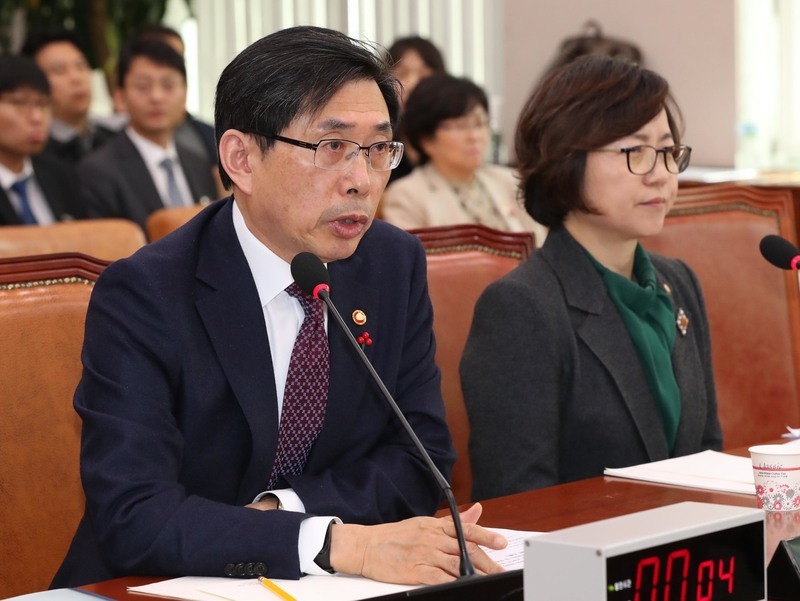 |
|
After Justice Minister Park Sang-ki announced plans to shutdown virtual currency exchanges, the government reflected its confusion over the issue by announcing that it was going back to square one in crafting a response to the exchanges on Jan. 15. (Hankyoreh Archive)
|
Justice Minister’s proposals to shutdown exchanges dismissed by other senior administration officials
The South Korean government is going to back to square one with its confusion-plagued regulatory response to the volatile virtual currency market. Justice Minister Park Sang-ki previously touched off a controversy on Jan. 11 by proposing the hardline move of an exchange shutdown. Since then, the administration has gone on record as saying this was Park’s idea alone and had not been coordinated within the government. Critics are arguing that the muddled response reflects the government’s attempts to keep up with changing opinion and market conditions – comparing them to firefighters chasing embers that are spreading in heavy winds. A press conference at the Seoul Central Government Complex on Jan. 15 by Jung Ki-joon, head of economic policy coordination in the Office of the Prime Minister, ended with the reading of a more than two-minute-long government position statement. No questions were taken from the press. The message was clear and to the point, stating plans to “implement a real-name system for cryptocurrency and holdings joint investigations by prosecutors, police, and financial authority to respond sternly to illegal transaction-related activities, including market rigging, money laundering, and tax evasion.” “The matter of whether to close exchanges as suggested recently by the Justice Minister is to be decided after sufficient discussions and coordination at the pan-governmental level,” it read. In short, Seoul stated that its policy response is returning to something along the lines of the “special measures” it announced on Dec. 28. “It’s been hard to ignore the negative opinion toward the Justice Ministry’s plan, which has gotten bad enough that people are posting petitions with the Blue House to have the Justice Minister executed,” said a senior Blue House official. “Some within the government are saying Minister Park acted too rashly in announcing a hardline approach publicly,” the source added, suggesting the heavy backlash from the public was responsible for the change in tack. It’s a case of backtracking that was predicted by many – and one that appears likely to happen again. Since establishing a task force in September for a pan-government response, the administration has consistently stressed efforts to “stamp out overheated speculation,” but the basis for its conclusion remains unclear. Regulations have been ratcheted up from the special measures last month to the recently proposed hardline move of shutting down exchanges – mainly in response to the so-called “kimchi premium” remaining consistently in the range of 30–40%. This suggests the intensity of the administration’s regulatory response could drop if the premium were to decline for any reason. Concerns over market volatility The kimchi premium alone does not appear to be the key basis for stiffer regulations, either. The government’s main concern appears to be the very volatility of the virtual currency market. Unlike other financial assets, Bitcoin and other virtual currencies bear no connection to real assets, which makes their prices extremely hard to predict. This means the administration is unlikely to let up on regulations if the kimchi premium is reined in. “Virtual currencies are a social phenomenon with the potential to become a political burden,” explained a senior Blue House official. “If there were a [price] collapse or hard landing, it could mean not just an economic blow but a greater impact on South Korean society as a whole,” the official said. In a Jan. 14 meeting with reporters, Prime Minister Lee Nak-yon mentioned the example of the so-called “KIKO incident.” “This was a case where all these people pounced out of personal greed, and then blamed the government when it didn’t work out,” Lee said, adding that speculators were “going to blame the government again if [virtual currencies] go bust.” In both cases, the warning went beyond the kimchi premium to the potential shock waves of a collapse. Preparations for a government response have been poor. In the past two months, the presiding office within the Ministry of Strategy and Finance – which is currently developing a taxation plan as part of the government’s stiffer regulatory measures – has shifted from the financial taxation team to the value-added tax division, and then again this year to the property and consumption tax division. This indicates the government has yet to determine whether trading profits should be subject to capital gains, value added, or transaction taxes. By Kim Kyung-rak and Seong Yeon-cheol, staff reporters Please direct questions or comments to [english@hani.co.kr]






